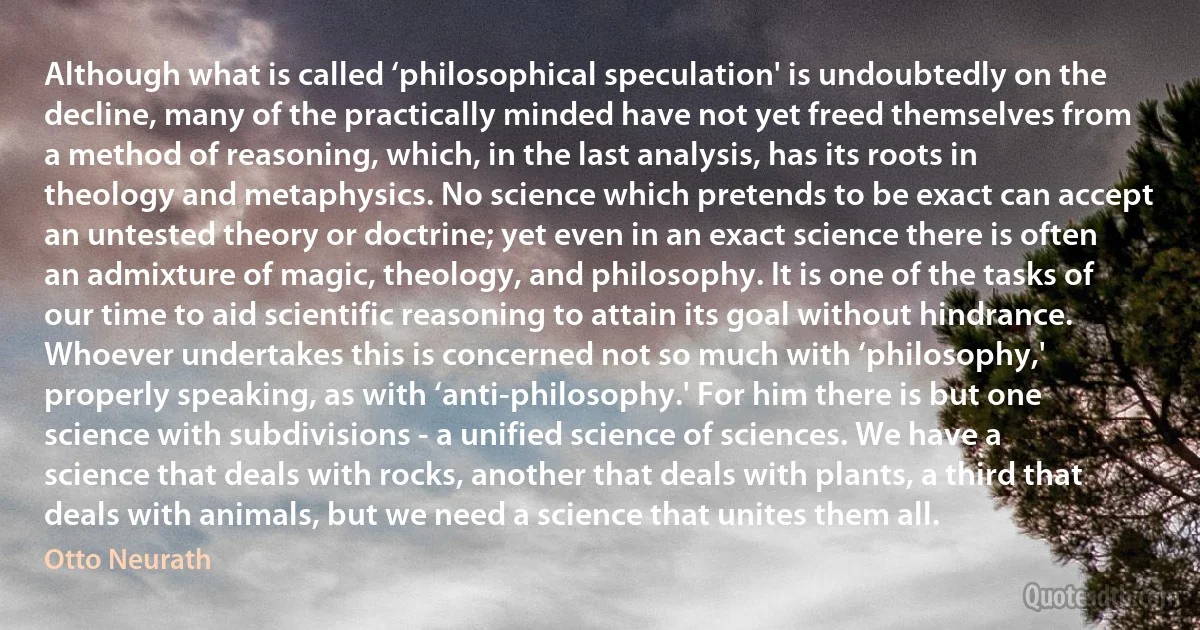
Although what is called ‘philosophical speculation' is undoubtedly on the decline, many of the practically minded have not yet freed themselves from a method of reasoning, which, in the last analysis, has its roots in theology and metaphysics. No science which pretends to be exact can accept an untested theory or doctrine; yet even in an exact science there is often an admixture of magic, theology, and philosophy. It is one of the tasks of our time to aid scientific reasoning to attain its goal without hindrance. Whoever undertakes this is concerned not so much with ‘philosophy,' properly speaking, as with ‘anti-philosophy.' For him there is but one science with subdivisions - a unified science of sciences. We have a science that deals with rocks, another that deals with plants, a third that deals with animals, but we need a science that unites them all.
Otto NeurathRelated topics
admixture doctrine hindrance last metaphysics need science speaking speculation theology third time yet rocks roots sciencesRelated quotes
In the following decades "Kierkegaard remained completely unknown, Schelling's work was contemptuously buried, and Marx and Feuerbach were interpreted as dogmatic materialists. Then a new impetus came in the 1880's with the work of Dilthey, and particularly with Freidrich Nietzsche, the "philosophy of life” movement, and the work of Berson. The third phase came after the shock of WWI – "Kierkegaard and the early Marxists were rediscovered and the serious challenges to the spiritual and psychological basis of Western society given by Nietzsche could no longer be covered over by Victorian self-satisfied placidity. The specific form of the third phase owes much to the phenomenology of Edmond Husserl, which gave to Heidegger, Jaspers, and the others the tool they needed to undercut the subject object cleavage which had been such a stumbling block to science as well as philosophy.

Rollo May
THEY who are acquainted with the present state of the theory of Symbolical Algebra, are aware, that the validity of the processes of analysis does not depend upon the interpretation of the symbols which are employed, but solely upon the laws of their combination. Every system of interpretation which does not affect the truth of the relations supposed, is equally admissible, and it is thus that the same process may, under one scheme of interpretation, represent the solution of a question on the properties of numbers, under another, that of a geometrical problem, and under a third, that of a problem of dynamics or optics. This principle is indeed of fundamental importance; and it may with safety be affirmed, that the recent advances of pure analysis have been much assisted by the influence which it has exerted in directing the current of investigation.

George Boole
We must first of all, however, definitely understand, in reference to the end we have in view, that it is not the concern of philosophy to produce religion in any individual. Its existence is, on the contrary, presupposed as forming what is fundamental in every one. So far as man s essential nature is concerned, nothing new is to be introduced into him. To try to do this would be as absurd as to give a dog printed writings to chew, under the idea that in this way you could put mind into it. It may happen that religion is awakened in the heart by means of philosophical knowledge, but it is not necessarily so. It is not the purpose of philosophy to edify, and quite as little is it necessary for it to make good its claims by showing in any particular case that it must produce religious feeling in the individual.

Georg Wilhelm Friedrich Hegel
I reproach myself for a gross error. But I would reproach myself more if I had persisted in an error after observations revealed it clearly to be that. I made a deal of money in the late 1940s on the bull side, ignoring Satchel Paige's advice to Lot's wife, "Never look back.” Rather I would advocate Samuelson's Law: "Always look back. You may learn something from your residuals. Usually one's forecasts are not so good as one remembers them; the difference may be instructive.” The dictum "If you must forecast, forecast often,” is neither a joke nor a confession of impotence. It is a recognition of the primacy of brute fact over pretty theory. That part of the future that cannot be related to the present's past is precisely what science cannot hope to capture. Fortunately, there is plenty of work for science to do, plenty of scientific tasks not yet done.

Paul Samuelson
Much of social science has been built as a citadel against metaphysics and politics. Faithful to the outlook produced by the modern revolt against ancient philosophy, the classic social theorists were anxious to free themselves first from the illusions of metaphysics, then from the seeming arbitrariness of political judgments. They wanted to create a body of objective knowledge of society that would not be at the mercy of philosophical speculation or political controversy, and, up to a point, they succeeded. But now we see that to resolve its own dilemmas, social theory must again become, in a sense, both metaphysical and political. It must take a stand on issues of human nature and human knowledge for which no "scientific" elucidation is, or may ever be, available. And it must acknowledge that its own future is inseparable from the fate of society.

Roberto Mangabeira Unger
